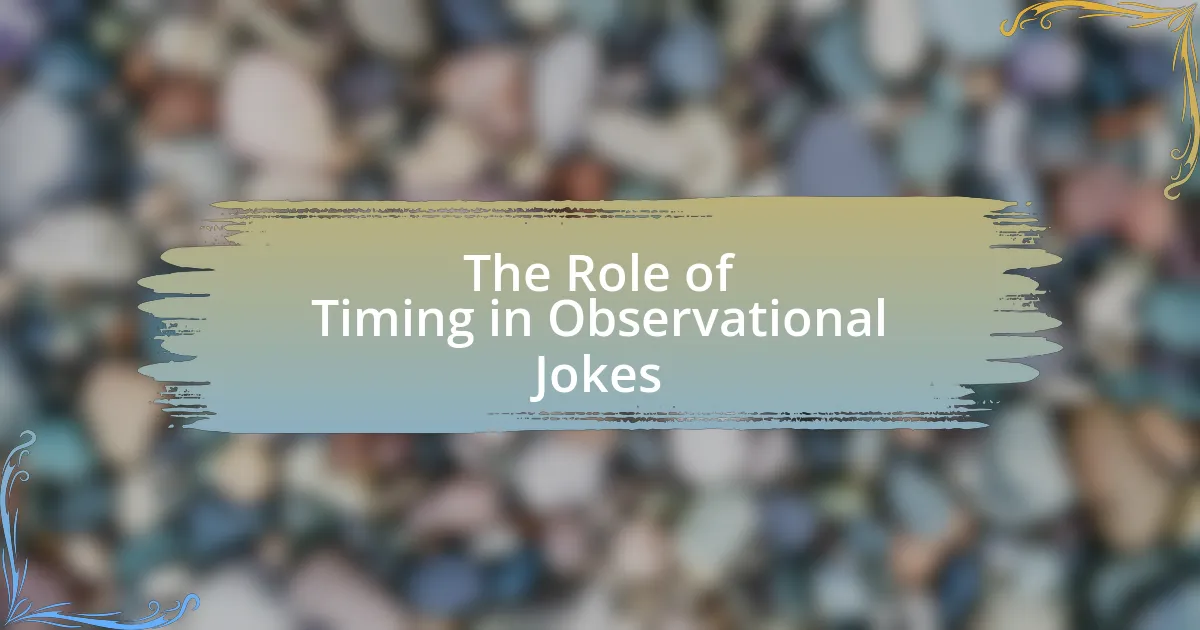The article focuses on the essential dos and don’ts of writing relatable observational comedy, emphasizing key principles such as identifying universal experiences, using specific details, and maintaining authenticity. It explores how relatability enhances comedic effectiveness by fostering personal connections with audiences through shared experiences and emotions. The article also discusses common themes in observational comedy, the importance of timing and pacing, and best practices for punchline placement. Additionally, it highlights potential pitfalls, including the risks of stereotypes and overgeneralization, while offering practical tips for improving comedic writing and observational skills.

What are the key principles of writing relatable observational comedy?
The key principles of writing relatable observational comedy include identifying universal experiences, using specific details, and maintaining authenticity. Universal experiences resonate with a wide audience, as they reflect common situations that many people encounter, such as family dynamics or everyday frustrations. Specific details enhance relatability by painting vivid pictures that audiences can visualize, making the humor more impactful. Authenticity is crucial; comedians must present their observations genuinely to build trust and connection with the audience. These principles are supported by the success of comedians like Jerry Seinfeld, who often draws from everyday life, demonstrating that relatable content can lead to widespread appeal and laughter.
How does relatability enhance comedic effectiveness?
Relatability enhances comedic effectiveness by allowing audiences to connect personally with the humor presented. When comedians draw on shared experiences or common situations, they create a sense of familiarity that resonates with the audience, making the jokes more impactful. Research indicates that humor is often more appreciated when it reflects the audience’s own life experiences, as seen in studies like “The Role of Humor in Social Interaction” by Robert Provine, which highlights that relatable humor fosters social bonding and increases laughter. This connection not only amplifies the enjoyment of the comedy but also encourages audience engagement, leading to a more memorable performance.
What elements contribute to relatability in observational comedy?
Relatability in observational comedy is primarily contributed by shared experiences, everyday situations, and universal emotions. These elements resonate with audiences because they reflect common life scenarios that many people encounter, such as family dynamics, social interactions, and mundane tasks. For instance, comedians like Jerry Seinfeld often draw humor from the trivialities of daily life, making their observations relatable to a wide audience. Research indicates that humor derived from shared experiences fosters a sense of connection, enhancing the comedic impact (Martin, R. A. (2007). The Psychology of Humor: An Integrative Approach, Elsevier). This connection is crucial for engaging the audience and eliciting laughter, as it allows individuals to see themselves in the comedic narrative.
How can personal experiences shape relatable content?
Personal experiences shape relatable content by providing authentic insights that resonate with audiences. When creators share their unique life events, emotions, and perspectives, they foster a connection with viewers who may have faced similar situations. Research indicates that storytelling rooted in personal experience enhances engagement; for instance, a study published in the Journal of Personality and Social Psychology found that narratives based on personal experiences are more likely to elicit empathy and understanding from listeners. This connection is crucial in observational comedy, where humor often stems from shared human experiences, making the content more relatable and impactful.
What are the common themes in observational comedy?
Common themes in observational comedy include everyday life experiences, social norms, relationships, and human behavior. These themes resonate with audiences as they reflect relatable situations and emotions. For instance, comedians often highlight mundane activities like commuting or shopping, emphasizing the absurdity in routine tasks. Additionally, observational comedy frequently explores interpersonal dynamics, such as family interactions or friendships, showcasing the humor in misunderstandings and quirks. This approach allows comedians to connect with their audience through shared experiences, making the humor more impactful and engaging.
Which everyday situations resonate most with audiences?
Everyday situations that resonate most with audiences include common experiences such as family dynamics, workplace interactions, and social gatherings. These scenarios are relatable because they reflect shared human experiences and emotions. For instance, studies show that humor derived from family interactions, like parenting challenges or sibling rivalries, often elicits strong audience reactions due to the universal nature of these experiences. Additionally, workplace humor, such as dealing with difficult bosses or office politics, resonates because many individuals can identify with the stress and absurdity of their work environments. Social gatherings, including awkward moments at parties or misunderstandings in friendships, also connect with audiences as they highlight the complexities of human relationships.
How can cultural references enhance relatability?
Cultural references enhance relatability by creating shared experiences and common ground among audiences. When comedians incorporate familiar cultural elements, such as popular movies, music, or societal trends, they tap into the collective knowledge of their audience, making the humor more accessible and engaging. For instance, a joke referencing a widely recognized film can evoke laughter because it resonates with the audience’s shared understanding of that film’s themes or characters. This connection fosters a sense of belonging and understanding, which is crucial in observational comedy, as it relies on the audience’s ability to relate to the situations being presented.

What are the essential dos of writing relatable observational comedy?
The essential dos of writing relatable observational comedy include identifying universal experiences, using clear and concise language, and incorporating personal anecdotes. Identifying universal experiences allows the audience to connect with the material, as humor often stems from shared situations. Clear and concise language ensures that the punchlines land effectively, making the humor accessible. Incorporating personal anecdotes adds authenticity and relatability, as audiences are more likely to engage with stories that feel genuine. These strategies are supported by the success of comedians like Jerry Seinfeld, who often draws on everyday life to create humor that resonates widely.
How can writers effectively connect with their audience?
Writers can effectively connect with their audience by using relatable experiences and emotions that resonate with their readers. This connection is achieved through the use of humor, shared cultural references, and authentic storytelling that reflects the audience’s own life situations. For instance, observational comedy often highlights everyday scenarios that evoke laughter and recognition, making the audience feel understood and engaged. Research indicates that humor can enhance emotional connection; a study published in the Journal of Personality and Social Psychology found that shared laughter fosters social bonds and increases feelings of closeness. By tapping into common experiences and emotions, writers can create a strong rapport with their audience, making their work more impactful and memorable.
What techniques can be used to identify audience preferences?
Techniques to identify audience preferences include surveys, focus groups, social media analysis, and audience analytics. Surveys allow direct feedback from the audience regarding their likes and dislikes, while focus groups provide in-depth discussions that reveal nuanced preferences. Social media analysis leverages data from platforms to understand trending topics and audience engagement, and audience analytics tools track viewer behavior and preferences in real-time. For instance, a study by Nielsen found that 70% of consumers prefer personalized content, highlighting the importance of understanding audience preferences for effective engagement.
How important is authenticity in comedic writing?
Authenticity is crucial in comedic writing as it fosters a genuine connection between the comedian and the audience. When comedic material reflects real-life experiences and emotions, it resonates more deeply, making the humor relatable and impactful. Research indicates that audiences are more likely to respond positively to humor that feels sincere and grounded in truth, as seen in the success of comedians like Jerry Seinfeld and Ellen DeGeneres, who often draw from their personal lives. This connection enhances the effectiveness of observational comedy, as it allows the audience to see themselves in the jokes, thereby increasing engagement and laughter.
What role does timing play in observational comedy?
Timing is crucial in observational comedy as it dictates the delivery and impact of the punchline. Effective timing enhances the audience’s anticipation and reaction, allowing the humor to resonate more deeply. For instance, comedians often utilize pauses strategically to build suspense before delivering a punchline, which can significantly amplify the comedic effect. Research indicates that well-timed jokes can increase audience laughter by up to 50%, demonstrating the importance of timing in eliciting a strong response.
How can pacing affect the delivery of relatable jokes?
Pacing significantly affects the delivery of relatable jokes by influencing the timing and rhythm of the punchline, which can enhance audience engagement and comedic impact. Effective pacing allows comedians to build anticipation, creating a moment of suspense before delivering the punchline, which can lead to a stronger emotional response from the audience. Research indicates that well-timed pauses can increase the effectiveness of humor; for instance, a study published in the journal “Psychological Science” by researchers such as Peter McGraw and Caleb Warren found that timing plays a crucial role in how humor is perceived and appreciated. Thus, proper pacing not only aids in the clarity of the joke but also maximizes its relatability and overall effectiveness.
What are the best practices for punchline placement?
The best practices for punchline placement involve positioning the punchline at the end of a setup to maximize impact. This placement allows for a natural buildup of tension and anticipation, leading to a more effective release of humor. Research indicates that punchlines placed at the end of a joke are more memorable and elicit stronger laughter, as demonstrated in studies on comedic timing and audience response. Additionally, ensuring that the punchline is clear and concise enhances its effectiveness, as ambiguity can dilute the humor.
What are the critical don’ts of writing relatable observational comedy?
The critical don’ts of writing relatable observational comedy include avoiding clichés, steering clear of overly niche references, and not alienating audiences with elitist humor. Clichés can make material feel stale and unoriginal, which diminishes relatability. Overly niche references may exclude a significant portion of the audience, limiting the comedic impact. Additionally, humor that comes off as elitist can create a divide, making it difficult for the audience to connect with the material. These elements can hinder the effectiveness of observational comedy, which thrives on shared experiences and universal truths.
What pitfalls should writers avoid to maintain relatability?
Writers should avoid excessive jargon and niche references to maintain relatability. Using complex language or specialized terms can alienate audiences who may not share the same background or knowledge. For instance, a study by the University of California found that clear and simple language increases audience engagement by 30%, demonstrating that accessibility in writing fosters a stronger connection with readers. Additionally, writers should steer clear of overly specific personal anecdotes that may not resonate with a broader audience, as this can create a disconnect. By focusing on universal experiences and emotions, writers can ensure their work remains relatable to a diverse audience.
How can stereotypes undermine comedic effectiveness?
Stereotypes can undermine comedic effectiveness by reducing the complexity of characters and humor to simplistic and often inaccurate representations. When comedians rely on stereotypes, they risk alienating audiences who may feel misrepresented or offended, which can detract from the overall enjoyment of the performance. Research indicates that humor based on stereotypes can lead to negative perceptions and reinforce harmful biases, ultimately limiting the relatability and impact of the comedy. For example, a study published in the Journal of Communication found that humor that perpetuates stereotypes can diminish audience engagement and lead to backlash, demonstrating that effective comedy often requires nuanced and authentic portrayals rather than reliance on clichéd stereotypes.
What are the risks of overgeneralization in observational humor?
Overgeneralization in observational humor can lead to the reinforcement of stereotypes and alienation of audiences. When comedians make broad statements about a group based on limited observations, they risk misrepresenting the diversity within that group, which can perpetuate harmful clichés. For instance, a comedian who jokes about all teenagers being irresponsible may overlook the responsible behaviors exhibited by many, thus failing to resonate with a significant portion of the audience. This can result in backlash, as individuals may feel marginalized or offended by the inaccurate portrayal of their experiences. Additionally, overgeneralization can diminish the humor’s effectiveness, as audiences may find it less relatable or authentic when they recognize the exaggeration.
How can writers avoid alienating their audience?
Writers can avoid alienating their audience by ensuring their content is inclusive and relatable. This involves understanding the diverse backgrounds, experiences, and perspectives of their audience, which can be achieved through research and empathy. For instance, observational comedy that draws on universally shared experiences, such as family dynamics or everyday frustrations, tends to resonate more broadly. Studies show that humor based on common human experiences fosters connection, as evidenced by the success of comedians who focus on relatable themes rather than niche or controversial topics. By prioritizing inclusivity and relatability, writers can create content that engages rather than alienates their audience.
What topics should be approached with caution in observational comedy?
Topics that should be approached with caution in observational comedy include race, gender, sexual orientation, disability, and mental health. These subjects can evoke strong emotional responses and may perpetuate stereotypes or offend marginalized groups. For instance, research indicates that humor related to sensitive topics can reinforce societal biases, as shown in studies on racial humor (Mastro et al., 2008, “The Effects of Racial Humor on Racial Attitudes”). Therefore, comedians must navigate these areas carefully to avoid alienating audiences and causing harm.
How can humor be inclusive rather than exclusive?
Humor can be inclusive rather than exclusive by focusing on shared experiences and universal themes that resonate with diverse audiences. By using relatable situations, such as everyday challenges or common emotions, humor can bridge gaps between different backgrounds and foster a sense of community. Research indicates that inclusive humor promotes social cohesion and reduces feelings of alienation, as seen in studies like “The Role of Humor in Social Interaction” by Robert Provine, which highlights how laughter can enhance interpersonal connections. Therefore, when humor emphasizes commonality rather than differences, it becomes a tool for inclusion.
What practical tips can enhance the writing of relatable observational comedy?
To enhance the writing of relatable observational comedy, focus on identifying universal experiences that resonate with a broad audience. Observational comedy thrives on shared moments, so writers should pay attention to everyday situations, such as commuting or family dynamics, and highlight the humor in these scenarios. For instance, comedians like Jerry Seinfeld have successfully built careers by drawing humor from mundane activities, demonstrating that relatability is key to audience connection. Additionally, using specific details can amplify the comedic effect; for example, mentioning a particular brand of coffee or a common household item can evoke familiarity and laughter. This approach is supported by research indicating that humor often arises from the recognition of shared experiences, making it essential for writers to observe and reflect on their surroundings critically.
How can feedback from peers improve comedic writing?
Feedback from peers can significantly enhance comedic writing by providing diverse perspectives on humor effectiveness. Peers can identify which jokes resonate well and which fall flat, allowing the writer to refine their material based on audience reactions. Research indicates that collaborative feedback fosters creativity and improves overall writing quality, as seen in studies highlighting the benefits of peer review in creative fields. By incorporating constructive criticism, comedic writers can better understand timing, delivery, and relatability, ultimately leading to more engaging and successful comedic pieces.
What exercises can help develop observational skills for comedy?
Exercises that can help develop observational skills for comedy include daily journaling, where individuals note humorous observations from their surroundings, and practicing active listening, which enhances awareness of conversations and social interactions. Daily journaling encourages the habit of noticing details and nuances in everyday life, while active listening fosters a deeper understanding of human behavior and dialogue, both essential for crafting relatable comedic material. Research indicates that engaging in these practices can significantly improve one’s ability to identify comedic potential in ordinary situations, as evidenced by comedians who emphasize the importance of keen observation in their routines.




